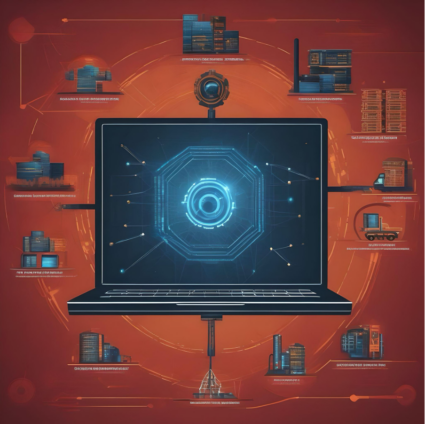In our modern world, industrial control systems (ICS) play a vital role in managing and optimising critical infrastructure. From power plants to manufacturing facilities, these systems ensure the smooth operation of essential services. However, the same technological advancements that have revolutionised industries also bring with them a range of cybersecurity vulnerabilities. In this blog, we will take a closer look at the complex landscape of ICS cybersecurity, exploring the risks and implications for our society.
Legacy Systems and Outdated Software:
One of the primary challenges in ICS cybersecurity lies in the prevalence of legacy systems and outdated software. Many industrial control systems rely on aging hardware and software that were not initially designed with robust security features. These systems often lack the ability to withstand modern cyber threats, leaving them vulnerable to exploitation. Additionally, outdated software may no longer receive security updates and patches, making them even more susceptible to known vulnerabilities and exploits.
Interconnectivity and Convergence:
The convergence of operational technology (OT) and information technology (IT) networks poses another significant challenge to ICS cybersecurity. As industrial control systems become more interconnected with corporate networks and the internet, the attack surface for potential threats increases exponentially. Malware, ransomware, and unauthorized access attempts can now target ICS, potentially leading to disruptive and dangerous consequences.
Supply Chain Risks:
The interconnected nature of supply chains in the industrial sector presents unique cybersecurity challenges. Third-party vendors and suppliers may introduce vulnerabilities into industrial control systems through the products and services they provide. A successful supply chain attack targeting these vulnerabilities can cause widespread disruption to critical infrastructure and have far-reaching consequences.
Human Factors:
Despite technological advancements, human error remains a major contributor to cybersecurity incidents in industrial environments. Employees with access to industrial control systems may inadvertently introduce vulnerabilities through misconfigurations, weak passwords, or falling victim to social engineering attacks. Addressing these human factors through comprehensive cybersecurity training and awareness programs is crucial for mitigating these risks.
Lack of Encryption and Authentication:
Robust encryption and authentication mechanisms are essential for protecting sensitive data and control commands transmitted across ICS networks. Unfortunately, many industrial control systems lack adequate encryption, leaving the data vulnerable to interception and tampering. Weak or default authentication mechanisms further compound this vulnerability, potentially allowing unauthorized individuals to gain control over critical systems and manipulate them for malicious purposes.
Remote Access and Third-party Connections:
While remote access capabilities can offer operational flexibility and efficiency in managing industrial control systems, they also introduce security risks. If not properly secured, remote access or third-party connections can serve as entry points for attackers, potentially leading to system disruption or sabotage. Organizations must implement stringent access controls and secure remote connections to protect against these threats.
Lack of Patch Management:
The unique operational requirements of industrial control systems make patch management challenging. Concerns about system stability and downtime often lead organizations to delay or even forgo patching altogether. However, timely application of security patches is critical for addressing known vulnerabilities and reducing the risk of exploitation. Organizations must strike a balance between system stability and strong patch management practices.
Complexity and Interdependencies:
Industrial control systems are inherently complex, with various interconnected components and subsystems working together to ensure operational efficiency. However, this complexity also creates challenges for cybersecurity. A vulnerability in one component can have cascading effects throughout the entire system. Understanding and managing these interdependencies are vital for mitigating cybersecurity risks in industrial environments.
Conclusion:
The vulnerabilities within industrial control systems present a formidable challenge to the integrity and stability of critical infrastructure worldwide. Safeguarding against these vulnerabilities demands a multifaceted approach, one that integrates advanced technological solutions, robust organizational policies, and ongoing workforce training initiatives. By grasping the intricacies of ICS cybersecurity and embracing tailored mitigation strategies, organizations can fortify the resilience and safeguard the security of their industrial control systems within the ever-evolving landscape of digital interconnectedness.
Protect Your Industrial Control Systems Today!
Are you ready to safeguard your critical infrastructure against the complexities of modern cybersecurity threats? Global Secure Solutions offers cybersecurity solutions and expertise to fortify the resilience of your industrial control systems.
Contact us now at https://globalsecuresolutions.com/contact to learn more about how our tailored cybersecurity strategies can safeguard the integrity and stability of your operations. Don't wait until it's too late, partner with Global Secure Solutions to secure your industrial control systems and ensure peace of mind in an interconnected world.
Latest Stories
-
Center for Learning and Childhood Development Director Dr Kwame Sakyi honoured at Ghana Philanthropy Awards
8 hours -
Asantehene receives 28 looted artefacts
9 hours -
CAF WCL 2024: Ghana’s Thelma Baffour wins title with TP Mazembe
9 hours -
Benjamin Boakye slams politicisation of energy sector issues and ECG’s inefficiencies
9 hours -
Erastus Asare Donkor and Dr Neta Parsram win big at 10th Mining Industry Awards
10 hours -
Government is “suppressing information” about power sector challenges – IES Director
10 hours -
Majority of our debts caused by forex shortfall – ECG Boss
10 hours -
Pan-African Savings and Loans supports Ghana Blind Union with boreholes
11 hours -
Bole-Bamboi MP Yussif Sulemana donates to artisans and Bole SHS
11 hours -
Top up your credit to avoid potential disruption – ECG to Nuri meter customers
11 hours -
Dutch & Co wins 2024 Entrepreneur of the Year Award
11 hours -
We’ll cut down imports and boost consumption of local rice and other products – Mahama
14 hours -
Prof Opoku-Agyemang donates to Tamale orphanage to mark her birthday
15 hours -
Don’t call re-painted old schools brand new infrastructure – Prof Opoku-Agyemang tells gov’t
15 hours -
Sunon Asogli plant will be back on stream in a few weeks – ECG
15 hours

